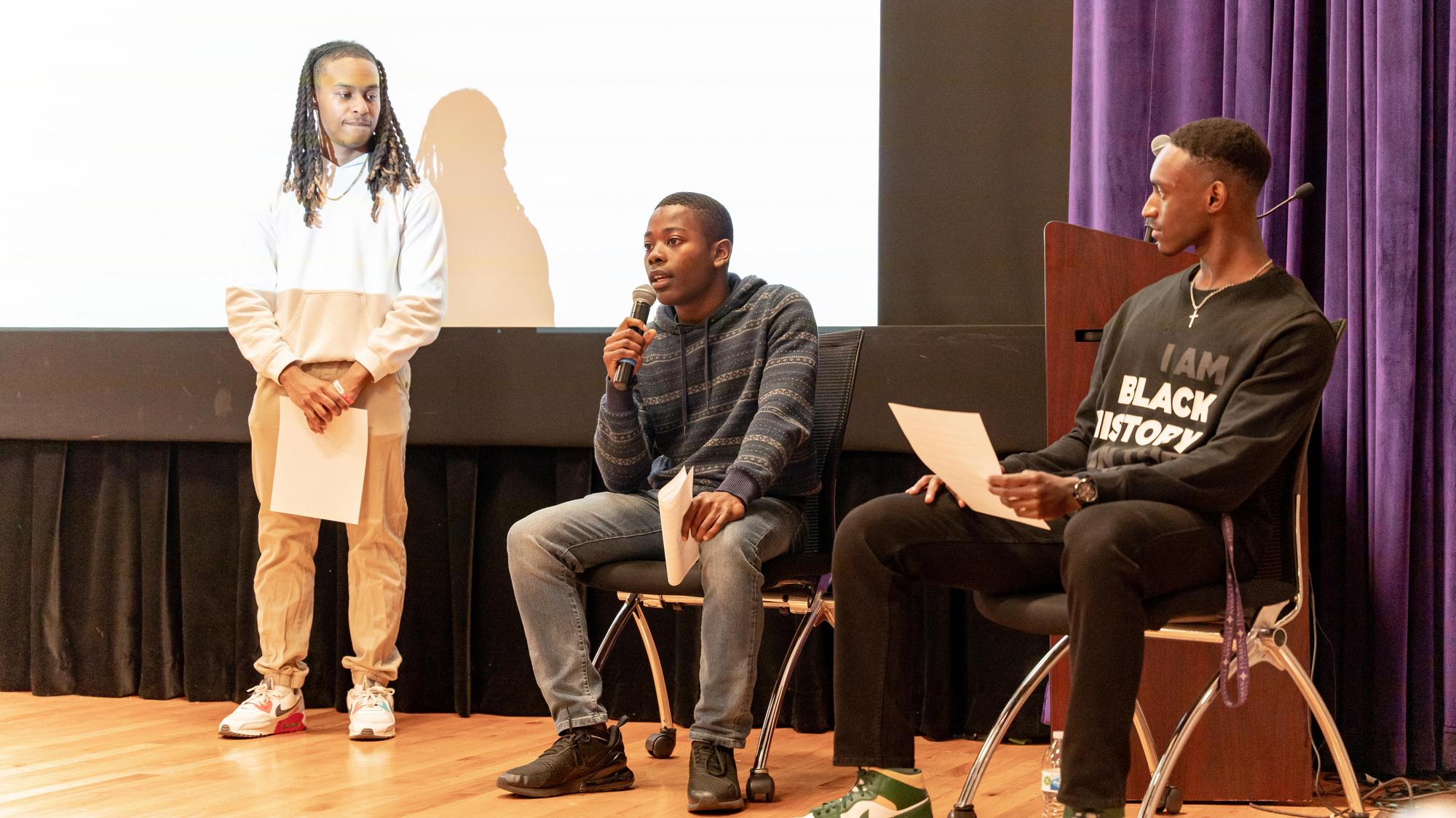‘I Feel You, Man’ offers frank discussion of mental health challenges

Furman celebrates Black History Month
Read more stories >>
“I am a Black man but more than an athlete.”
“I am articulate, but I am not whitewashed.”
“I am Black, but I am not a gangster.”
“I am a Black student, but I am not a diversity statistic.”
“I am a human, but I am not a token.”
The statements on the screen had been written by the four panelists sitting on the stage – young Black men, three current Furman students and one recent graduate. The words resonated with many in the audience in the Trone Student Center’s Burgiss Theater for the CLP event, “I Feel You, Man: Black Men and Mental Health,” part of the university’s schedule of Black History Month events.
The event was presented by the Furman chapter of Kappa Alpha Psi fraternity and the Furman University Counseling Center. Jalen Livingston ’25 led the discussion with Charles Miles II ’23, Dae’one Wilkins ’22, Kyler Bailey ’26 and Mekhi Harrell ’25 after some opening remarks by Terance Dawkins, counselor and case manager at the counseling center.
“How many of you actually know these gentlemen?” Dawkins asked the audience. “Know their life history, know what they’ve been through, know all their experiences? Tonight, this program is supposed to help you understand them not just based on what you see but based on the experiences they’ve had here at Furman University.”
The panelists openly and candidly answered Livingston’s questions about their challenges, like the one Miles faced as an incoming student wearing his Furman gear around his predominantly white hometown community in Fort Mill, South Carolina.
“The first question I always got was not ‘What are you planning on majoring in?’ or ‘Why did you choose Furman?’” Miles remembered. “It was, ‘What sport do you play? What position do you play?’”
Similar questions used to upset Bailey, who agreed with Miles that it was important to unpack those assumptions.
“I finally learned to just educate them,” Bailey said, “so that the next time they see a tall, Black male in school attire they don’t automatically assume, ‘Oh, he’s an athlete; he’s only here because he’s good physically, not academically.’”
Other questions drew out the panelists’ thoughts on being the only person of color in a classroom, the need for a safe space where they can be “powerful yet vulnerable,” and struggles with social identity and fitting in on campus.
“Lessons from the past directly impact how we are in the present,” Dawkins told the audience after the panelists shared their experiences. Although everybody experiences them in their own way, he said, messages like “Men don’t cry,” “Don’t be a girl” and “Shut up before I give you something to cry about” are passed down from generation to generation.
Men often hear the word “emotional” as a derogative description of women, noted Franklin Ellis, associate dean and director of Furman’s Center for Inclusive Communities, who joined the discussion from the audience. “What we’re really talking about is emoting,” he said. “It is the ability to show the emotion that you were feeling and talk about it and be comfortable with it.”
That ability is socialized more in people assigned female at birth, Ellis said, citing psychological studies of how adults interact in different ways with babies they perceive to be of different genders.
“We’re taught not to understand a lot of that,” he said. “So there’s a lot of toxic masculinity that goes into play there. From birth, we’re shown how not to emote, how not to read emotion.”
Part of the intergenerational trauma has to do with how Black bodies are perceived in our culture, said Ellis.
“We are expected to be superhuman while treated as subhuman,” he said. “I have to try twice as hard to get half as far. So pain is something I can endure, but we sell it as resilience. And it damages us.”
The discussion made Jayden Jones ’24 consider “the intersectionality of every person.”
“We are so many things, but we are also not so many things,” he said. “They’re all Black men sitting up there, but they’re different Black men. Everybody has experienced different things, and that’s OK.”